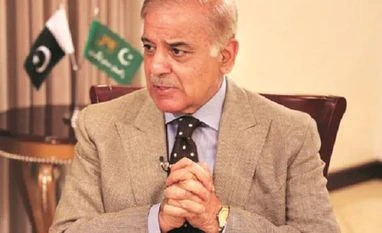Pakistan, India have a lot to gain from mutually beneficial trade: Sharif
Pakistan PM Shehbaz Sharif has said that Islamabad is looking to forge partnerships for its geo-economics strategy, especially within the region, which includes New Delhi
)
Pakistan PM Shehbaz Sharif
Pakistan Prime Minister Shehbaz Sharif has said that Islamabad is looking to forge partnerships for its geo-economics strategy, especially within the region, which apparently includes New Delhi.
He was responding to a question about trade with India in an interview with Turkish media outlet Anadolu Agency ahead of his three-day visit to the country, Dawn reported. However, Sharif arrived in Turkey for the visit on Tuesday.
Shehbaz said that as part of its shift from geo-strategy to geo-economics, Pakistan is looking to forge partnerships, especially within the region, based on connectivity.
"Pakistan and India have a lot to gain from mutually beneficial trade," he said as quoted by Dawn. "We are cognisant of the economic dividends that can be accrued from a healthy trade activity with India," the Prime Minister said further.
It is to be noted that after coming to power in Pakistan in early April, Shehbaz Sharif has written a letter to Indian Prime Minister Narendra Modi expressing his desire for peaceful ties with India and the resolution of all the outstanding issues.
Also Read
This comes in the wake of PM Modi's congratulatory wishes to the then newly elected Pakistani counterpart. Sharif, in his reply, thanked PM Modi for congratulating him and said that his country desires peaceful and cooperative ties with India, reported ARY News.
In his first address to the National Assembly after being sworn in, Sharif had said, "We want good ties with India but durable peace is not possible until the Kashmir dispute is resolved."
On Tuesday, India and Pakistan finalised and signed the annual report of the Permanent Indus Commission for the year which ended on March 31, 2022.
The Indus Water Treaty has survived the wars between the two countries and the freeze in bilateral relations.
The relations between India and Pakistan have been strained due to Uri, Pathankot and Pulwama terror attacks in Jammu and Kashmir with New Delhi making it clear that talks and terror cannot go together.
(Only the headline and picture of this report may have been reworked by the Business Standard staff; the rest of the content is auto-generated from a syndicated feed.)
More From This Section
Don't miss the most important news and views of the day. Get them on our Telegram channel
First Published: Jun 01 2022 | 7:30 AM IST
